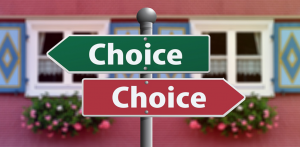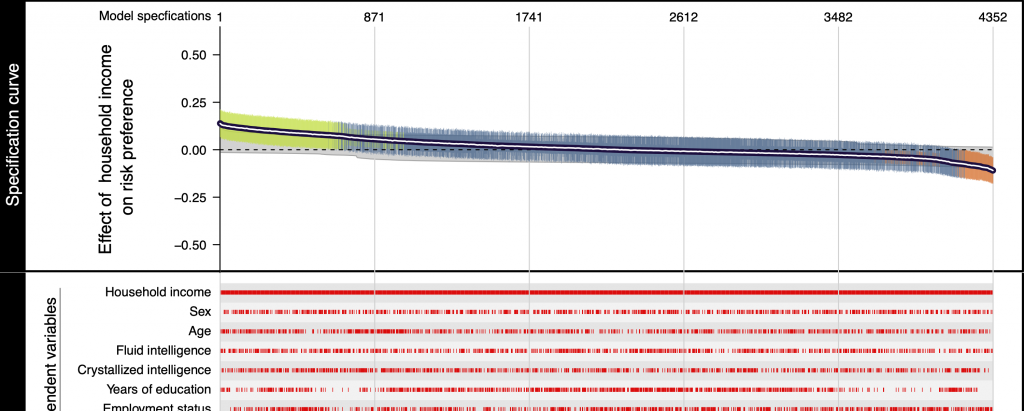quarantine is taking a toll. i’m behind with teaching (let’s not even talk research), i haven’t filed my taxes, and my children need more attention than ever. it’s official: only music can save me now!
Archive for March, 2020
Psychological Science & Corona: Explanation to children (in German)
Kudos to Prof. Dr. Hanna Christiansen (Uni Marburg) und Prof. Dr. Silvia Schneider (Uni Bochum).
Covid-19: Nine lessons from psychology to make good decisions now
Uninews just published a piece written by me in collaboration with Rainer Greifeneder on insights from (social) psychology that can help us to make good decisions given the current pandemic. The article is available in English and German – feel free to share!
Covid-19: Nine lessons from psychology to make good decisions now
Covid-19: Neun Erkenntnisse aus der Psychologie, um jetzt gute Entscheidungen zu treffen
CANCELLED!

I’ve spent quite some time this week cancelling events, including this week’s SWE colloquium, an event about the use of social media for professional purposes “Let social media find your future job”, this year’s edition of the Bernoulli workshop, as well as a number of in-person lectures and seminars. This sucks! But it’s the right thing to do.
The corona epidemic is on the rise, with doubling of confirmed cases every few days (4!) in Switzerland and many other European countries, including, Italy, France, Germany, and Portugal (hi, Mom!).
According to Richard Neher, virologist professor at Uni Basel, in the worst-case-scenario, the Swiss medical system can become overburden quickly (end of April). This would have implications not only for corona patients but the whole health system and, therefore, society as a whole – we don’t want to be in the yellowish scenario depicted below…

So, what can a single individual do? Here’s my current top 3…
- Stay safe: There are a number of behaviors we should be adopting (maintaining hygiene, social distancing) – cancelling stuff is just the price we pay for being on the safe side.
- Stay informed: Our World in Data provides a comprehensive list of data resources concerning the corona epidemic that is worth checking out. And while this may not do much per se, seeing some numbers and graphs can give one (me!) a sense of control that is helpful in the face of great uncertainty.
- Stay positive: It’s important to find a balance between being paralysed by the fear of a worst-case-scenario and dismissive about the whole thing. The right attitude is a mix of optimism and reasonable concern. Just hope for the best while preparing for the worst!
New paper in JPSP: Identifying robust correlates of risk preference
In the behavioral sciences it has long been a goal to identify variables that are systematically associated with people’s risk preferences. Yet, evidence concerning many “candidate correlates” (e.g., wealth, age, sex, education) has been mixed, because previous studies tended to focus on single variables (i.e., not taking into account many competing predictors) and to implement few operationalizations of risk preference. In our paper recently published in JPSP (see here for the PDF), we tackled this issue in a novel way: using specification curve analysis (SCA), we assembled all possible model specifications given the variables of our dataset, which resulted in over 1 million models (incl. simulation analyses). Thanks to our powerful sciCORE at the University of Basel, we could efficiently estimate these models using traditional OLS and Bayesian methods.
A key advantage of SCA is its possibility to visualize results of extensive modeling analyses transparently. The main findings indicated that a person’s sex and age have robust and consistent associations with people’s risk preferences, whereas other candidate correlates showed less consistent or no associations. The results also demonstrate the important role of construct operationalization when assessing people’s risk preferences: self-report measures picked up various associations with the proposed correlates, but behavioral measures largely failed to do so. In sum, we hope that our paper illustrates how exhaustive modeling analyses can provide conclusive answers to important theoretical issues in the behavioral sciences.
Frey, R., Richter, D., Schupp, J., Hertwig, R., & Mata, R. (2020). Identifying robust correlates of risk preference: A systematic approach using specification curve analysis. Journal of Personality and Social Psychology. doi:10.1037/pspp0000287 | PDF
First appeared on https://renatofrey.net/blog
risky talk
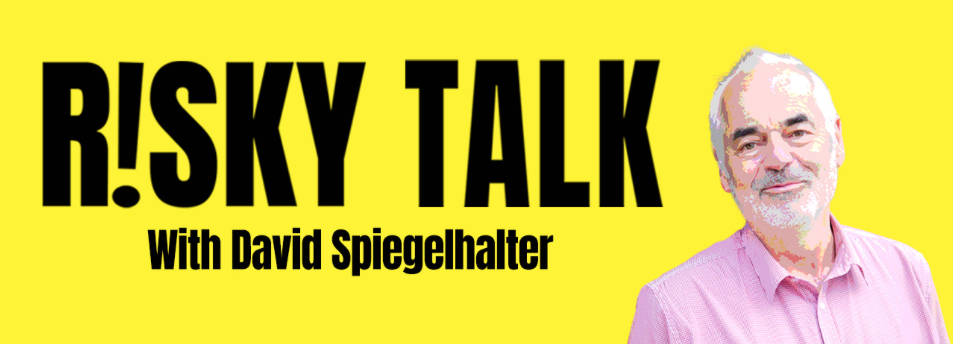
These are uncertain times but science can help us navigate uncertainty by investigating the best strategies to talk about and understand many of the risks that surround us all, from health epidemics to climate change.
David Spiegelhalter, Chair of the Winton Centre for Risk and Evidence Communication has a new podcast – Risky Talk – that covers many of these topics – check it out!
fighting covid-19 with behavioural science
Covid-19 has spread around the globe and Switzerland is no exception. Dealing with Covid-19 is currently as much a medical problem as it is a behaviour-change problem. Identifying vaccines to protect those who haven’t yet been infected and medication to treat those that have is, of course, a priority. In the meanwhile, however, the best strategy is to prevent the virus from spreading by getting everyone to engage in sensible health behaviours, including hand washing, reducing or altering aspects of social interaction (shaking hands), and increasing the use of tele-medicine. These measures will not stop the spread but can reduce its speed and allow the health system provide care to those who need it most.
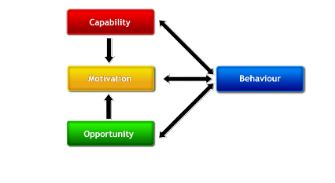
The COM-B Model
Susan Michie, Professor of Health Psychology and Director of Centre for Behaviour Change, University College London, has argued that we can use existing behavioural models to help guide such interventions. Specifically, Michie proposes that considering the capability, motivation, and opportunity factors (COM-B model) can be instrumental and help policy makers and practitioners change a number of behavioural targets, including hand washing (see Table below).
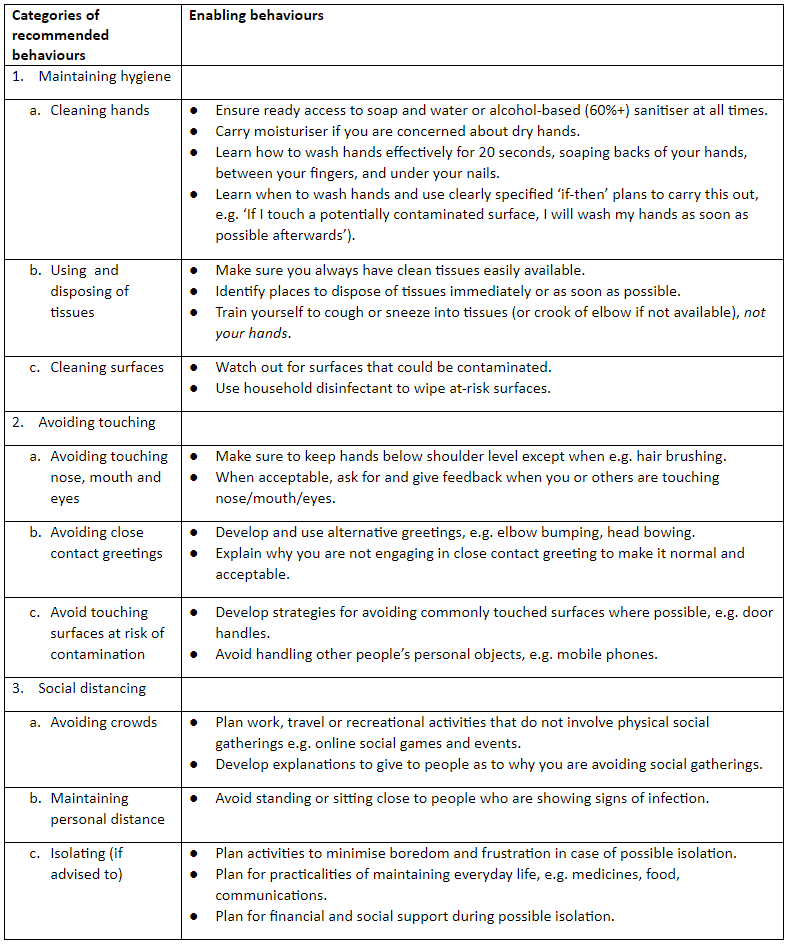
While these are reasonable, the model of human behaviour could likely be more detailed: For example, should we appeal to self-interest (self protection) or altruistic motives (protecting the ones that need most) in persuading the public? Should we use case examples (i.e., “think of your grandfather”) or population statistics as persuasion devices?
I am curious to see how psychological theory will contribute to measurable behavioural change in the fight against covid-19.
